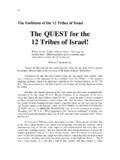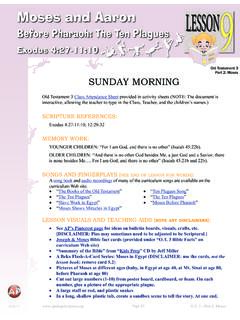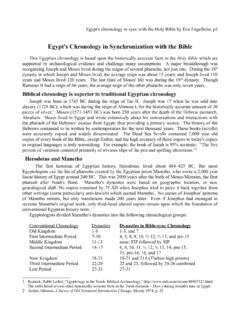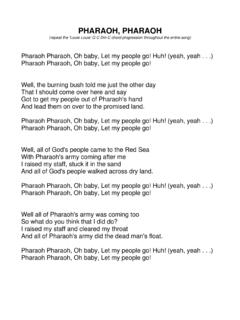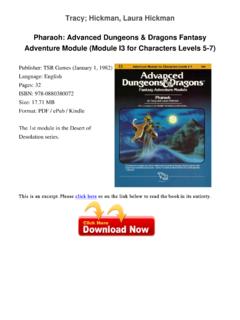Transcription of Who Was the Pharaoh - Triumph Pro
1 37 who was the Real Pharaoh of the Exodus? Egyptian history has been totally confused by Egyptologists, and as a result the true account of the Exodus of Israel under Moses has been denied, misunderstood, and rejected by world historians and scholars. But new historical light on the ancient Egyptian dynasties leads to a massive reconstruction of Egyptian history, which fits perfectly with the Biblical account of the Exodus. Ipuwer was an Egyptian eye-witness to the plagues which struck Egypt, and he saw the collapse of the greatest Dynasty of Egypt up to that time. who was the real Pharaoh who led Egypt to her destruction and doom? What happened to him? Was his life cut short in the turbulent maelstrom of the Red Sea crossing?
2 William F. Dankenbring who was the Pharaoh of the Exodus? Did the awesome ten plagues recounted in the Biblical story of the Exodus really happen? Was there independent Egyptian eye-witness corroboration of these unique, spectacular plagues? For generations Biblical scholars have rejected the Biblical account of the Exodus, and Moses leading the children of Israel about 3,000,000 strong out of Egypt. The event did not fit in with what was believed about Egyptian dynastic history of that period of time. However, new scholarship has shed amazing new light on this age-old controversy and dilemma. A new book by Ted T. Stewart, entitled Solving the Exodus Mystery, goes a long way to dispel the scholarly bias and prejudice against Biblical history of the Exodus period. In this chapter we will explore just a relatively small portion of Stewart s research into the Exodus problem and its repercussions on ancient Egyptian history.
3 The Biblical Record Speaks Let us read through the Biblical account of this most amazing time and event. Beginning in Exodus 14, the Lord said to Moses, And I will harden Pharaoh s heart, that HE shall follow after them; and I will be honored UPON Pharaoh , and upon all his host; that the Egyptians may know that I am the Lord (Exodus 14:4). Notice! God said He would harden Pharaoh s heart, and that he Pharaoh would follow after the fleeing Israelites, not just an army he sent after them. Then God said He would be honored upon Pharaoh , as well as upon all his host. This certainly sounds like God meant He would bring calamity on both Pharaoh and his army. But notice, also: God then said that as a result, the Egyptians would know that He is the Lord. If God had intended Pharaoh to survive the holocaust, then why didn t He say that then Pharaoh would know that He is the Lord ?
4 38 But let s read on. The account continues, And it was told the king of Egypt that the people fled: and the heart of Pharaoh and of his servants was turned against the people, and they said, Why have we done this, that we have let Israel go from serving us? And HE ( Pharaoh ) MADE READY HIS CHARIOT, and took his people WITH HIM: And he took six hundred chosen chariots, and all the chariots of Egypt, and captains over every one of them .. and HE pursued after the children of Israel .. But the Egyptians pursued after them, ALL the horses and chariots of Pharaoh , and his horsemen, and his army, and overtook them encamping by the sea .. And when Pharaoh drew nigh the children of Israel lifted up their eyes .. (Exodus 14:5-10). Notice how clear the account is that Pharaoh himself led this massive army.
5 He was at the head. He wanted the glory to be his, and his alone. He was a megalomaniac of his time, and his people worshipped him as a god. God Almighty, however, had other ideas in mind. He told Moses again that He would get me honour upon Pharaoh , and upon all his host, upon his chariots, and upon his horsemen (Exo. 14:17). In verse 23 we read, And the Egyptians PURSUED, and went in after them to the midst of the sea. EVEN ALL Pharaoh s horses, his chariots, and his horsemen. Not one remained behind! Everyone plunged into the sea, in hot pursuit including Pharaoh himself! Now verse 27 -- .. and the Lord overthrew the Egyptians in the midst of the sea. And the waters returned, and covered the chariots, and the horsemen, and ALL the host of Pharaoh that came into the sea after them; THERE REMAINED NOT SO MUCH AS ONE OF THEM ( )!!! How awesome! Indeed, God did get Himself glory, not only upon Pharaoh s army and chariots, but also upon Pharaoh himself!
6 In chapter 15 of Exodus, the children of Israel sang a song about this fantastic, incredible deliverance from Egypt. They sang, unto the Lord, for he hath triumphed gloriously: THE HORSE AND HIS RIDER hath he thrown into the sea (verse 1). Pharaoh s chariots and his host hath he cast into the sea: his chosen captains also are drowned in the Red Sea (verse 4). The ENEMY (and remember, the enemy was Pharaoh himself, more than anyone else!) said, I will pursue, I will overtake, I will divide the spoil .. Thou didst blow with thy wind, the SEA COVERED THEM: they sank as lead in the mighty waters ( ). Notice this final, conclusive, incontrovertible proof. God records in His inviolate Word: FOR THE HORSE OF Pharaoh WENT IN WITH HIS CHARIOTS AND WITH HIS HORSEMEN INTO THE SEA, and the Lord brought again the waters of the sea upon them .. (Ex. 15:19). Psalm 136 corroborates this account.
7 The Psalmist recounts the miracles of the Exodus and the plagues upon Egypt. And then he states categorically: Oh, give thanks to the LORD of lords! For His mercy endures forever.. To Him who divided the Red Sea in two, for His mercy endures forever; and made Israel pass through the midst of it, for His mercy endures forever; but OVERTHREW Pharaoh and his army in the Red Sea, for His mercy endures forever (Psalm 136:3, 13-15, NKJV). How clear! 39 God says plainly that the horse of Pharaoh himself went in with his chariots and with his horsemen where? INTO THE SEA ! And the waters covered them including therefore Pharaoh himself! Pharaoh himself was overthrown in the Red Sea! That s what the Word of God, which cannot be broken, says (see John 10:35).
8 What more evidence could we ask for? But was that the end of the story? In Psalm 78:53 we read that the sea overwhelmed their enemies, and Pharaoh was certainly their chief enemy! In Psalm 106:11 we read, And the waters covered their enemies: THERE WAS NOT ONE OF THEM LEFT ! What could be clearer than that? Who was this Pharaoh ? And what really happened to him? Who was this figure in ancient Egyptian history? What is the true answer to this puzzling enigma? Egyptian History Unveiled Egyptologists divide Egypt s historic past into the following major periods: 1. The Old Kingdom, when most of the pyramids were built; the fourth and sixth dynasties are the best known. 2. The first interregnum, when the land fell into chaos, and central authority was abolished. Of the seventh to tenth dynasties, almost nothing is known. 3. The Middle Kingdom, comprising the eleventh, twelfth and thirteenth dynasties.
9 Feudal Egypt became united in the twelfth dynasty. Egyptian literature reached a height never again attained. 4. Another period of chaos followed, during which Asiatic invaders, known as Amu or Hyksos seized control over a prostrate Egypt and ruled without mercy for 400 years. This chaos occurred because of the plagues of God upon Egypt, bringing an end to the Middle Kingdom and paving the way for the incursion of barbaric hordes. The Biblical record calls these Hyksos invaders the Amalekites, whom Joshua and Israel fought bitterly in the wilderness of Sinai when they left Egypt. Rabbinic sources put the number of Amalekite soldiers whom Joshua fought at 400,000. As Israel was moving out of Egypt, the Amalekites, a fierce and nomadic tribe, were moving toward the ancient civilization they left behind in ruins, the Egyptian army totally buried beneath the Red Sea, Egypt s economy in a shambles, her people desolate.
10 5. The New Kingdom the Hyksos were expelled from Egypt at the same time the Amalekites were defeated by king Saul of Israel. At this time the eighteenth dynasty, founded by Ahmose (Amasis I) arose to power, with the renowned kings of Thutmose I, Queen Hatshepsut, Thutmose III, the greatest of all Egyptian conquerors, Amenhotep II, and so forth; this was a period of the building of the magnificent temples at Luxor and Karnak, in the Valley of the Nile. The Exodus and the Middle Kingdom If the Exodus occurred during the eighteenth dynasty, in the reign of Amenhotep II, then it must have been apparently a minor occurrence in the history of that time, so minor, indeed, that the nations most concerned in it next to the Jews themselves, the Egyptians, never took the trouble to record it (Hugo 40 Winckler, Berlin, Kritische Schriften).

